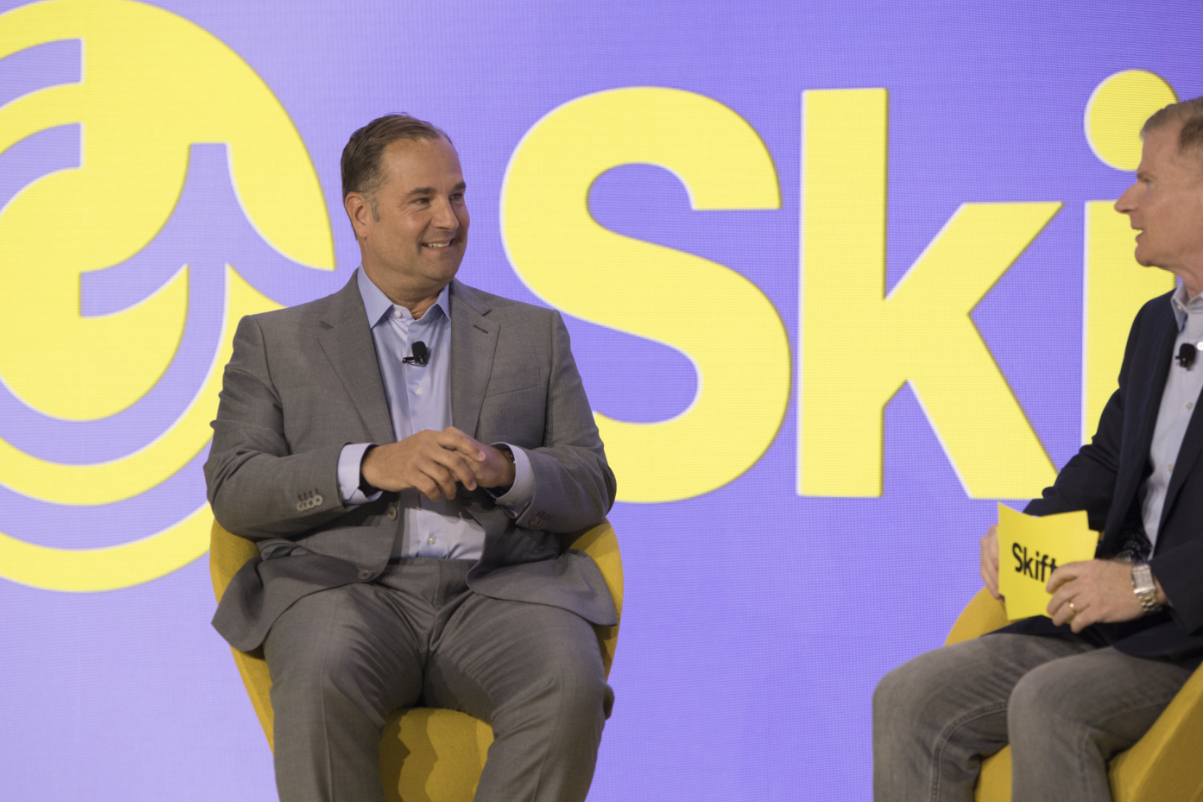TUI Takes Its Own Remote Working Further With Free Hotel Stays
Skift Take
TUI’s remote work policy, launched during the pandemic, is set to evolve as the travel giant looks to offer its staff free stays across its hotel and resort network.
The so-called Workwide scheme was set up in August last year, and allows employees to work anywhere in the world for up to 30 working days, which equates to six weeks. They can also tag holidays either side to extend the duration.
It’s proved a hit. In just over a year, employees notched up a collective 10,000 days of remote working. If that were one employee, it’s the equivalent of 38 years, TUI’s chief people officer Sybille Reiss has calculated. It’s almost enough to retire, but Reiss is only getting started.
Blending Travel With Work
TUI acted relatively early on in July 2021 to offer remote work (where possible) to its 60,000-strong workforce, several months ahead of Airbnb.
A month later it launched Workwide because employees said they needed more flexibility, particularly if they had relocated during the pandemic and wanted to spend time with family in their home country.
Now for the next phase Reiss said TUI will look at offering free accommodation. That means keeping enough rooms available for growing numbers of applicants, which sounds like a revenue manager’s nightmare.
“We’d like to progress the approach a little bit. What we’d like to do now, starting maybe at the end of the spring season, we have left rooms sometimes, and we’d like to offer that to our people, to get our people into the hotel experience of TUI. Even on a cruise ship," Reiss said.
"We’d like to merge the TUI resort feeling with our approach of TUI Workwide, we’d give that for a limited price. The thinking is they’d just have to pay for food, but the hotel rooms are for free … this is our current thinking," she added.
Surprising Destinations
There are plenty of findings non-travel companies can learn from. First, it's not just about staff jetting off to exotic destinations. TUI's most popular Workwide destinations are the UK, Spain and Germany.
"Sometimes people in our Caribbean office are traveling to London and would like to work from London, or Berlin," Reiss said.
TUI is also pushing ahead with its digitization process, and that means staffing up on developers. Access to its resorts, or the chance to work anywhere, is a valuable tool when hiring. "Recruiting, especially in the digital space, we have new fields we can recruit from. From banks, because this flexibility is not offered by many employers," Reiss said.
And Reiss also believes it doesn't need to be complicated. Staying below 30 days means staff don't get caught up in any tax rules.
"I would recommend to any other chief people officers, give that flexibility," she said. "Because we know people would like to change jobs, and they’re looking out for flexibility, in time and in location. This is something that is very low in cost to the employer, but it gives the full choice to our people."
Sidenotes
Expect to see stricter travel policies, alongside more ambitious targets to cut back on flying, in the near future. That’s the main takeaway from a new survey carried out by pollster IPSOS.
It quizzed more than 2,500 employees in the U.S., UK, France, Germany and Spain, and an overwhelming majority said their employer should act in the fight against global warming.
Of course, there’s always a discrepancy in what people think should happen, and what does happen — the "say-do" effect. And these findings should be taken with a pinch of salt too, because the report was commissioned by a campaign to lower emissions, called Travel Smart. It's calling on businesses to return to no more than 50 percent of 2019 levels when it comes to business travel.
But the numbers are relatively high: 77 percent of corporate employees believe that a business has an important role to play in the fight against climate change.
And 74 percent say that to reduce levels of corporate flying, a business must set targets and include travel policies.
The survey also found that nearly three-quarters of employees believe that an important factor for reducing a business’s carbon footprint is curbing levels of corporate flying.
So that's relatively good news for travel management companies, less so for airlines.
“Corporate flying habits have changed and employees want a new normal where businesses take responsibility for reducing their share of emissions,” said Denise Auclair, corporate travel campaign manager at Transport & Environment, in a statement. “Change will happen with clear targets and policies that align with employees’ expectations. This can only help businesses in the current race to recruit and retain top talent”.
The survey also found just 27 percent of employees were currently flying as often as they did prior to the pandemic. Just 11 percent stated they were flying more frequently.
The poll was carried out in October.
Skift will be in conversation with Travalyst, the Global Sustainable Tourism Council and the Sustainable Hospitality Alliance to dig deeper into corporate intent during next week’s GBTA Sustainability Summit, held in Brussels.
10-Second Corporate Travel Catch-Up
Who and what Skift has covered over the past two weeks: Accor, Airbnb, Best Western, Hertz, Hilton, Hyatt, IHG, Lufthansa, Marriott, Sabre, SAP Concur, Selina, virtual speakers, Visa, Wyndham.
In Brief
Sabre Deepens Tech Partnership With BCD Travel
Dallas-based travel technology giant Sabre has signed a new deal with BCD Travel, with the long-term strategic partnership expected to help the agency become more agile. The two companies will jointly invest and collaborate on creative solutions to manage growing post-Covid travel complexities, evolving customer expectations and bring products to market faster. BCD Travel also expects to increase its booking levels with Sabre.
“Over the years, we've tackled industry challenges, innovated and grown together. Today, we take another important step in our partnership as we mutually commit to advancing the future of the travel," said Sabre president Kurt Ekert. Sabre this week reported that September was its strongest month for air booking volumes since the start of the pandemic, primarily because of increased international travel.
Skift’s in-depth reporting on climate issues is made possible through the financial support of Intrepid Travel. This backing allows Skift to bring you high-quality journalism on one of the most important topics facing our planet today. Intrepid is not involved in any decisions made by Skift’s editorial team.




